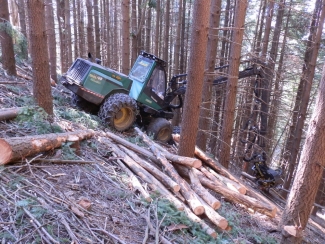Future wood demand rests on management and harvesting balance

In a new policy brief titled Knowledge and Technologies for our Forests of the Future, an international team of authors, led by Dr Diana Tuomasjukka, from EFI, compiled comprehensive findings of the ways in which forest resources could be harvested and managed more efficiently and sustainably to account for a careful balance of volume, production and technology.
The brief is based on research and testing done within the collaborative research project TECH4EFFECT (www.tech4effect.eu), jointly funded by the Bio Based Industries Joint Undertaking under the European Union’s Horizon 2020 research and innovation programme.
Due to rapid changes in forestry over the last 50 years, TECH4EFFECT was tasked with the job of developing easily accessible decision support systems to empower local forest managers and service providers with the knowledge needed to maintain efficiency development, while adhering to environmental best practice.
The European bioeconomy is one of the EU’s growing and most important sectors, accounting for seven per cent of its economy. The EU bioeconomy is heavily reliant on increased access to forest resources and increased wood mobilisation.
It is estimated that the demand for wood and wood-based products will continue to increase in Europe to satisfy the needs of the circular bio-based economy, or new green economy, which is based on an EU commitment to move away from a linear fossil fuel-based economy.
The authors point out that there are currently advanced machine systems as well as technological and management solutions for most geographical conditions, including winch supported harvester and forwarder in steep terrain.
Investments in the European bioeconomy can only be justified if the resource base represents a sustainable and consistent source of raw materials. European forestry needs to develop modern digital tools and management solutions to be able to supply the new green economy with the needed materials without compromising the health and well-being of our forests and our citizens.
Forming an intelligent and low impact value chain management, which to a far greater degree than in the past, will provide the information needed in truly balancing the environmental, economic and social impacts of the sector.
"A low impact value chain means having access to the most suitable harvesting equipment for a particular environment, at an appropriate time. It is important to facilitate the right training and skills development across the workforce, which is dominated by seasonality. The ageing workforce, the technological evolvement of machines and digital tools, as well as the difficulty in attracting younger workers to the sector are issues which need attention,” Dr Tuomasjukka said.
There is a lot of potential to further use digital maps, apps and models that can guide the harvesting operator to determine the best routes with the lowest impacts, for example, on water ways or sites of high cultural or biodiverse value, to improve environmental site management by practically guiding the worker in forested areas.
“These digital tools are also helpful in monitoring assortment value and fuel performance during the operation, as well as sharing relevant operational and volume information with other actors along the wood supply chain for improved logistics,” she added.
Within the current wood value chains, the different actors and stages are still too disconnected. This leads to time, energy, emissions and also volume of materials being lost or underutilized.
Improving information flow and increased digitalization on the processes and between the different actors and steps of the process chain has future optimization potential. TECH4EFFECT has developed a digital efficiency portal SILVISMART (www.silvismart.eu) to overcome this particular barrier.
SILVISMART is currently being tested in five European countries. It provides an essential tool for information sharing between the different, consenting actors in the value chain such as contractors, operators, forest owners and managers.
Knowledge and Technologies for our Forests of the Future can be downloaded here.
For more information, contact Dr Diana Tuomasjukka (diana.tuomasjukka@efi.int).
TECH4EFFECT has received funding from the Bio Based Industries Joint Undertaking under the European Union’s Horizon 2020 research and innovation programme under grant agreement No 720757.
Photo by Raffaele Spinelli


